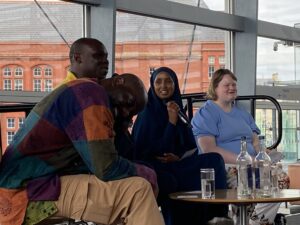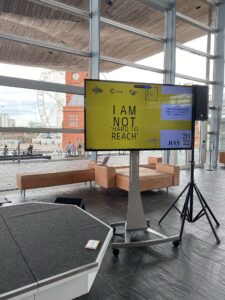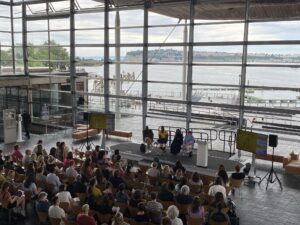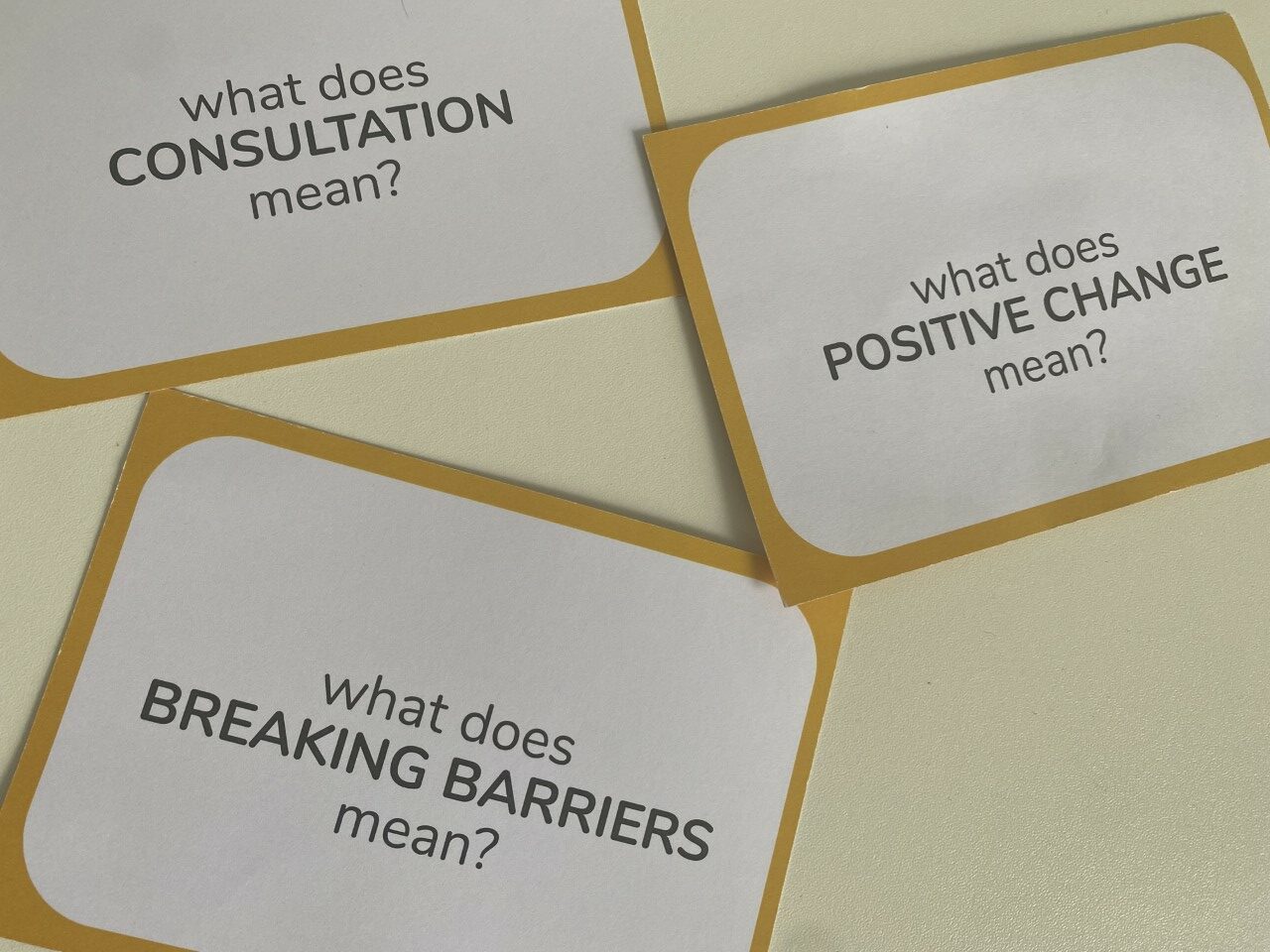“I am NOT hard to reach”: Is there a ‘right’ way to engage with communities? / NID yw’n anodd fy nghyrraedd: A oes ffordd ‘gywir’ o ymgysylltu â Chymunedau?
Tues 12 July 2022, Senedd, Cardiff – a public forum by Privilege Café and Community Voices Cardiff / Community Consultation for Quality of Life
 In a packed public event at the Senedd, Cardiff, Privilege Café founder and Community Voices Cardiff partnerships manager, invited an in-person and online audience to challenge the meanings and impact of phrases commonly used as part of community consultation, such as ‘hard-to-reach’, ‘breaking barriers’, ‘building bridges’, ‘empowering’, ‘real impact’, ‘community’, and ‘consultation’ itself.
In a packed public event at the Senedd, Cardiff, Privilege Café founder and Community Voices Cardiff partnerships manager, invited an in-person and online audience to challenge the meanings and impact of phrases commonly used as part of community consultation, such as ‘hard-to-reach’, ‘breaking barriers’, ‘building bridges’, ‘empowering’, ‘real impact’, ‘community’, and ‘consultation’ itself.
‘It’s insulting when you are told you are hard to reach.’ Panel speaker Lela Patterson, who has been blind since birth, opened the session by suggesting consultation can be best when simplified to conversation. ‘Make the effort: don’t be afraid to approach me. Ask me anything.’ Value the investment of the time and effort to build relationships, advised Matthew Gough, Senior Lecturer in Dance at the University of South Wales, who suggested that organisations’ use of the phrase ‘hard to reach’ simply reflects a lack of effort to work with people. ‘Who are the people willing to put in the time?’ Matthew questioned: ‘Do people in the organisation know how to speak to other people?’
Distinguishing between a neighbourhood as being where we live, and a community as transcending regional boundaries, social and cultural historian Abubakr Madden Al Shabazz emphasised the need to do groundwork before consultation in order to better understand belief systems, morals, cultures and norms as the ‘non-textbook knowledge’ of what makes up ‘community.‘ Defining expertise not as what you already know, but knowing what you need to learn in order to engage, the panel emphasised the need to know how to have difficult conversations to be able to understand conflicting needs. ‘We’re all labelled’, Lela summarised, ‘and we need to step away from that.’
Recommending that representation in consultation extends beyond ‘tickbox tokenism,’ Mymuna confirmed that ‘I’m always asked why “your” people are not engaging.’ ‘I come from the blind community, but I don’t speak for everyone’, Lela noted, while Abubakr emphasised the varied dynamics, intersectionality and diversity within any community which can’t be represented by a singular ‘representative’ voice. External organisations tend towards repeatedly working with ‘accepted’ representatives of communities, Matthew noted, summarising this approach as “You look different but you’re speaking ‘our’ language and so we accept you.” As a result, ‘the optics seem better but a few ‘representative’ people are holding power, and not sharing skills.’
The need for consultation processes to share power and skills was emphasised. ‘Grants always want you to consult, but you always go to the same people,’ audience members agreed, recommending that funders and organisations stop drawing the line at people they find ‘acceptable’ and instead give opportunities to multiple community ‘insiders’; that they invest in skills development across communities. ‘Don’t divest consultation funds from the communities’, the audience recommended, framing the use of external service providers as taking value away from the community in terms of both money and skills.
 The extraction of value through consultation was a key topic. Some audience members had given their time over decades responding to surveys and questionnaires, with no discernible change. ‘Sometimes you ask people to share their trauma over and over,’ an audience member noted. ‘How can I trust you to use my information? You’re asking me to share my trauma for no reason.’ The accountability and motivation of consultations were questioned.
The extraction of value through consultation was a key topic. Some audience members had given their time over decades responding to surveys and questionnaires, with no discernible change. ‘Sometimes you ask people to share their trauma over and over,’ an audience member noted. ‘How can I trust you to use my information? You’re asking me to share my trauma for no reason.’ The accountability and motivation of consultations were questioned.
Is your consultation transactional, or are you buying-in to a longer relationship?
What is the end goal of your consultation: are you aiming to work with a community, or simply to inform them of something which has already been decided?
What is the motivation for engagement?
Matthew flipped the concept of ‘hard to reach’ on its head, replacing it with ‘I choose to step away’ from redundant consultations with no accountability. When things don’t change because of consultations, when valuable time and accounts of lived experience are given with no subsequent visible action or follow-through, those involved choose not to gift any more of their time. Accountability was linked to the follow-through: how will those who consult return to the community to share results and test whether subsequent actions are working?
The accountability of consultation was linked into audience members’ direct experiences of the negative consequences of the language used in consultation, including terms such as ‘deprived’, ‘disadvantaged’ and ‘hard to reach.’ ‘Words attach to people: they label, blame, and stereotype’, Abubakr noted, quoting the Disposable Heroes of Hiphoprisy’s Language of Violence: ‘Words can reduce a person to an object.’
 Words which label a community have a legacy: they permeate through generations. People don’t forget the words which have been used against them and recognise when once-powerful terms such as ‘empowerment’ are co-opted for corporate use and stripped of their original meaning and power.
Words which label a community have a legacy: they permeate through generations. People don’t forget the words which have been used against them and recognise when once-powerful terms such as ‘empowerment’ are co-opted for corporate use and stripped of their original meaning and power.
The buzzwords of consultation are, the audience confirmed, well known and mistrusted.
Key questions and recommendations from the session were summarised as:
- Are the people you are trying to consult really ‘heard-to’reach’ or are they choosing to step away because the motivations and accountability of the consultation are mistrusted?
- Is your consultation intersectional? Is it aimed at a wide range of interests, norms, needs? Does it assume diversity within diverse communities, or does it expect a homogenous voice?
- Who has been ‘selected’ as the ‘acceptable’ voice of the community: how is the power and skills to lead consultation from within a community being shared and developed within communities?
- What does a consultation offer, and what does it extract? Does the consultation extract value from the community in terms of divesting funding and devaluing lived experience? What will be the tangible outcomes from the gifts of time and knowledge?
- Words really do matter: the buzzwords of consultation and the words used to describe the ‘problems’ of a community are known, mistrusted, remembered, and have lived consequences.
- And finally: keep it simple. Recognise the value of investing time to simply talk to people.
 ‘I am NOT hard to reach’ ran as the closing event of a 6-month Cardiff-based conversation led by Community Voices Cardiff as part of the UK-wide AHRC funded Community Consultation for Quality for Life (CCQoL.org) and the Welsh School of Architecture, Cardiff University.
‘I am NOT hard to reach’ ran as the closing event of a 6-month Cardiff-based conversation led by Community Voices Cardiff as part of the UK-wide AHRC funded Community Consultation for Quality for Life (CCQoL.org) and the Welsh School of Architecture, Cardiff University.
Mymuna Soleman, Shoruk Nekeb, Mhairi McVicar and Ruchit Purohit, along with Ali Abdi, Corey Smith and Sophey Mills of Cardiff University’s Community Gateway led a month-long series of conversations in Grange Pavilion in May 2022 with third sector organisations, Housing Associations, Cardiff Council, the Office of the Well-being of Future Generations, school pupils, Grange Pavilion Youth Forum, and many individuals. Shoruk Nekeb identified the phrases discussed in this session.
The 6-months of conversations will be presented back and discussed in sessions planned between 14-19 November 2022 at the Grange Pavilion, Grangetown. To find out more, visit https://ccqol.org/, or contact CommunityVoicesCardiff@cardiff.ac.uk
Text by Mhairi McVicar, Mymuna Soleman and Shoruk Nekeb, images by Mhairi McVicar
______________
Cymraeg
Dydd Mawrth 12 Gorffennaf 2022, Y Senedd, Caerdydd — fforwm cyhoeddus gan Caffi Privilege a Lleisiau Cymunedol Caerdydd/Ymgynghoriad Cymunedol ar gyfer Ansawdd Bywyd
Mewn digwyddiad cyhoeddus llawn dop yn y Senedd, Caerdydd, gwahoddodd sylfaenydd Privilege Café a rheolwr partneriaethau Community Voices Caerdydd gynulleidfa bersonol ac ar-lein i herio ystyron ac effaith ymadroddion a ddefnyddir yn gyffredin fel rhan o ymgynghoriad cymunedol, fel ‘anodd eu cyrraedd’,‘torri rhwystrau’, ‘adeiladu pontydd’, ‘grymuso’, ‘effaith go iawn’,’ cymuned ‘, ac ‘ymgynghori ‘ei hun.
‘Mae’n sarhaus pan ddywedir wrthych eich bod yn anodd i gyrraedd.’ Agorodd siaradwr y panel Lela Patterson, sydd wedi bod yn ddall ers genedigaeth, y sesiwn trwy awgrymu y gall ymgynghori fod orau pan gaiff ei symleiddio i sgwrs. ‘Gwnewch yr ymdrech: peidiwch â bod ofn dod ataf. Gofynnwch unrhyw beth i mi. ‘ Gwerthfawrogwch fuddsoddiad yr amser a’r ymdrech i adeiladu perthnasoedd, cynghorodd Matthew Gough, Uwch-ddarlithydd mewn Dawns ym Mhrifysgol De Cymru, a awgrymodd fod defnydd sefydliadau o’r ymadrodd ‘anodd ei gyrraedd’ yn adlewyrchu diffyg ymdrech i weithio gyda phobl. ‘Pwy yw’r bobl sy’n barod i roi eu hamser? ‘ Holodd Matthew: ‘Ydy pobl yn y sefydliad yn gwybod sut i siarad â phobl eraill? ‘
Gan wahaniaethu rhwng cymdogaeth fel lle rydym yn byw, a chymuned sy’n mynd y tu hwnt i ffiniau rhanbarthol, pwysleisiodd yr hanesydd cymdeithasol a diwylliannol Abubakr Madden Al Shabazz yr angen i wneud gwaith paratoi cyn ymgynghori er mwyn deall systemau cred, moesau, diwylliannau a normau yn well fel y ‘gwybodaeth sydd ddim mewn gwerslyfr’ am yr hyn sy’n ffurfio ‘cymuned.’ Gan ddiffinio arbenigedd nid fel yr hyn rydych eisoes yn ei wybod, ond gan wybod beth sydd angen i chi ei ddysgu er mwyn ymgysylltu, pwysleisiodd y panel yr angen i wybod sut i gael sgyrsiau anodd i allu deall anghenion sy’n gwrthdaro. ‘Rydyn ni i gyd wedi ‘ein labelu’, crynhodd Lela, ‘ac mae angen i ni gamu i ffwrdd o hynny.’
Gan argymell bod cynrychiolaeth mewn ymgynghoriad yn ymestyn y tu hwnt i ‘symbolaeth blwch ticio’, cadarnhaodd Mymuna ‘Dwi wastad yn cael fy holi pam nad yw “eich” pobl yn ymgysylltu.’ ‘Rwy’n dod o’r gymuned ddall, ond nid wyf yn siarad dros bawb’, nododd Lela, tra bod Abubakr yn pwysleisio’r ddeinameg amrywiol, y croestoriadedd a’r amrywiaeth o fewn unrhyw gymuned na ellir ei chynrychioli gan lais ‘cynrychioliadol’ unigol. Mae sefydliadau allanol yn tueddu i weithio dro ar ôl tro gyda chynrychiolwyr ‘derbyniol’ mewn cymunedau, nododd Matthew, gan grynhoi’r dull hwn fel “Rydych chi’n edrych yn wahanol ond rydych chi’n siarad ‘ein’ iaith ac felly rydyn ni’n eich derbyn chi.” O ganlyniad, ‘mae’r opteg yn ymddangos yn well ond mae ychydig o bobl ‘gynrychioliadol’ yn dal y grym, a ddim yn rhannu sgiliau. ‘
Pwysleisiwyd yr angen am brosesau ymgynghori i rannu grym a sgiliau. ‘Mae grantiau bob amser eisiau i chi ymgynghori, ond rydych chi bob amser yn mynd at yr un bobl’, cytunodd aelodau’r gynulleidfa, gan argymell bod cyllidwyr a sefydliadau yn rhoi’r gorau i greu darlun o’r bobl y maent yn eu gweld yn ‘dderbyniol’ ac yn lle hynny yn rhoi cyfleoedd i bobl ‘fewnol’ lluosog yn y gymuned; eu bod yn buddsoddi mewn datblygu sgiliau ar draws cymunedau. ‘Peidiwch â thynnu arian ymgynghori o’r cymunedau’, argymhellodd y gynulleidfa, gan fframio’r defnydd o ddarparwyr gwasanaethau allanol fel tynnu gwerth oddi wrth y gymuned o ran arian a sgiliau.
Roedd echdynnu gwerth drwy ymgynghori yn bwnc allweddol. Roedd rhai aelodau o’r gynulleidfa wedi rhoi o’u hamser dros ddegawdau yn ymateb i arolygon a holiaduron, heb unrhyw newid amlwg. ‘Weithiau rydych chi’n gofyn i bobl rannu eu trawma drosodd a throsodd,’ nododd aelod o’r gynulleidfa. ‘Sut alla i ymddiried ynoch chi i ddefnyddio fy ngwybodaeth? Rydych chi’n gofyn i mi rannu fy nhrawma am ddim rheswm.’ Cwestiynwyd atebolrwydd a chymhelliant ymgynghoriadau. A yw eich ymgynghoriad yn drafodaethol, neu a ydych chi’n ymrwymo i berthynas hirach? Beth yw nod terfynol eich ymgynghoriad: a ydych yn anelu at weithio gyda chymuned, neu’n syml i’w hysbysu am rywbeth sydd eisoes wedi’i benderfynu? Beth yw’r cymhelliant ar gyfer ymgysylltu?
Gwnaeth Matthew droi’r cysyniad o ‘anodd eu cyrraedd’ ar ei ben, gan ei ddisodli gyda ‘dwi’n dewis camu i ffwrdd’ o ymgynghoriadau diangen heb unrhyw atebolrwydd. Pan na fydd pethau’n newid oherwydd ymgynghoriadau, pan roddir amser gwerthfawr a phrofiad byw heb unrhyw gamau gweladwy dilynol neu ddilyniant, mae’r rhai dan sylw yn dewis peidio â rhoi mwy o’u hamser. Roedd atebolrwydd yn gysylltiedig â’r dilyniant: sut y bydd y rhai sy’n ymgynghori’n dychwelyd i’r gymuned i rannu canlyniadau a phrofi a yw camau gweithredu dilynol yn gweithio?
Roedd atebolrwydd ymgynghoriad yn gysylltiedig â phrofiadau uniongyrchol aelodau’r gynulleidfa o ganlyniadau negyddol yr iaith a ddefnyddir wrth ymgynghori, gan gynnwys termau fel ‘amddifad’, ‘difreintiedig’ ac ‘anodd eu cyrraedd.’ ‘Mae geiriau’n glynu wrth bobl: maen nhw’n labelu, yn beio, ac yn stereoteipio,’ nododd Abubakr, gan ddyfynnu Language of Violence Disposable Heroes of Hiphoprisy: ‘Gall geiriau leihau person i wrthrych. ‘
Mae gan eiriau sy’n labelu cymuned etifeddiaeth: maent yn treiddio trwy genedlaethau. Nid yw pobl yn anghofio’r geiriau sydd wedi cael eu defnyddio yn eu herbyn ac maent yn cydnabod pan mae termau a fu unwaith yn bwerus, fel ‘grymuso’, yn cael eu cyfethol at ddefnydd corfforaethol ac yn cael eu hamddifadu o’u hystyr a’u pŵer gwreiddiol.
Cadarnhaodd y gynulleidfa eu bod yn gyfarwydd â geiriau poblogaidd ymgynghoriadau a’u bod yn ddrwgdybus ohonynt.
Crynhowyd cwestiynau allweddol ac argymhellion y sesiwn fel a ganlyn:
- A yw’r bobl rydych chi’n ceisio ymgynghori â nhw wir yn ‘anodd eu cyrraedd’ neu a ydyn nhw’n dewis camu i ffwrdd gan eu bod yn ddrwgdybus o gymhellion ac atebolrwydd yr ymgynghoriad?
- A yw eich ymgynghoriad yn groestoriadol? A yw wedi’i anelu at ystod eang o ddiddordebau, normau, anghenion? A yw’n tybio amrywiaeth o fewn cymunedau amrywiol, neu a yw’n disgwyl llais homogenaidd?
- Pwy sydd wedi cael ei ‘ddewis’ fel llais ‘derbyniol’ i’r gymuned: sut mae’r pŵer a’r sgiliau i arwain ymgynghoriad o’r tu mewn i gymuned yn cael eu rhannu a’u datblygu o fewn cymunedau?
- Beth mae ymgynghoriad yn ei gynnig, a beth mae’n ei echdynnu? A yw’r ymgynghoriad yn echdynnu gwerth o’r gymuned o ran dargyfeirio cyllid a dibrisio profiad byw? Beth fydd y canlyniadau diriaethol o roi amser a gwybodaeth?
- Mae geiriau wir yn bwysig: mae geiriau poblogaidd ymgynghoriadau a’r geiriau a ddefnyddir i ddisgrifio ‘problemau’ cymuned yn hysbys, yn cael eu drwgdybio a’u cofio, ac yn arwain at ganlyniadau byw.
- Ac yn olaf: cadwch bethau’n syml. Cofiwch gydnabod y gwerth o fuddsoddi amser dim ond i siarad â phobl.
Cynhaliwyd ‘Dydw i DDIM yn anodd fy nghyrraedd’ fel y digwyddiad clo mewn sgwrs 6 mis yng Nghaerdydd dan arweiniad Lleisiau Cymunedol Caerdydd fel rhan o’r Ymgynghoriad Cymunedol ar gyfer Ansawdd Bywyd (CCQol.org), a gynhaliwyd ledled y DU ac a ariennir gan AHRC, ac Ysgol Pensaernïaeth Cymru, Prifysgol Caerdydd.
Arweiniodd Mymuna Soleman, Shoruk Nekeb, Mhairi McVicar a Ruchit Purohit, ynghyd ag Ali Abdi, Corey Smith a Sophey Mills o Borth Cymunedol Prifysgol Caerdydd fis o sgyrsiau ym Mhafiliwn Grange ym mis Mai 2022 gyda sefydliadau trydydd sector, Cymdeithasau Tai, Cyngor Caerdydd, Swyddfa Lles Cenedlaethau’r Dyfodol, disgyblion ysgol, Fforwm Ieuenctid Pafiliwn Grange, a llawer o unigolion. Nododd Shoruk Nekeb yr ymadroddion a drafodwyd yn y sesiwn hon.
Bydd y 6 mis o sgyrsiau’n cael eu cyflwyno a’u trafod mewn sesiynau sydd wedi’u trefnu rhwng 14-19 Tachwedd 2022 ym Mhafiliwn Grange, Grangetown. I gael gwybod mwy, ewch i https://ccqol.org/, neu cysylltwch â CommunityVoicesCardiff@cardiff.ac.uk